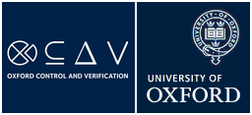Welcome to OXCAV
News
The 2006 article, co-authored by A. Abate, titled "Reachability Analysis of Controlled Discrete-Time Stochastic Hybrid Systems", appeared in the Proceedings of the "Hybrid Systems: Computation and Control" (HSCC) Conference, held in Santa Barbara (CA) in March 2006, has been awarded the 2024 HSCC "Test of Time" award. This prize is given to "recognise work published at an HSCC conference that has proven to be the most visionary and impactful, leading to new directions of research being initiated, or new applications being brought into the hybrid systems research community”.
The article ``Games for AI-Control: Models of Safety Evaluations of AI Deployment Protocols'' was presented at ICML24, at the Trustworthy Multi-modal Foundation Models and AI Agents (TiFA) Workshop, and is fully available at https://arxiv.org/abs/2409.07985
The paper titled "Fossil 2.0: Formal Certificate Synthesis for the Verification and Control of Dynamical Models," by A. Edwards, A. Peruffo and A. Abate, has received the Best RE Award (repeatability evaluation award for tool papers) at HSCC24, held in Hong Kong in May 2024 as part of the CPS-IoT Week.
The article ``Data-driven abstractions via adaptive refinements and a Kantorovich metric,'' led by A. Banse and L. Romao, and presented at CDC23, has received the award from the CSS Technical Committee on Hybrid Systems.
Alessandro Abate has been named 2024 Fellow of the Institute of Electrical and Electronics Engineers (IEEE), for his contributions to ``verification and control of stochastic hybrid systems''. 23 November 2023
An OXCAV paper, co-authored by Joar Skalse and Alessandro Abate, and entitled "Misspecification in Inverse Reinforcement Learning" has been selected for the Outstanding Paper Award for AAAI-23, a flagship conference in AI. This year AAAI received 8,777 submissions, of which 1,721 were accepted. Among these papers, the program committee selected the awarded paper.
The publication is openly accessible on the arXiv at: https://arxiv.org/pdf/2212.03201.pdf
We are delighted to announce that the article titled "On Imperfect Recall in Multi-agent Influence Diagrams" has won the Best Paper Award at the XIX Conference on Theoretical Aspects of Rationality and Knowledge (TARK23), held in June 2023. The contribution is led by OXCAV members J. Fox and L. Hammond, and co-authored by CS colleagues P. Harrenstein, A. Abate, and M. Wooldridge.
We are glad to report that OXCAV has three articles that will be presented at AAAI 2023. They are titled:
-
Probabilities Are Not Enough: Formal Controller Synthesis for Stochastic Dynamical Models with Epistemic Uncertainty
-
Misspecification in Inverse Reinforcement Learning
-
Low Emission Building Control with Zero-Shot Reinforcement Learning
Preprints are available on the ArXiV.
The contribution titled "All’s Well That Ends Well: Avoiding Side Effects with Distance-Impact Penalties" has received a ‘best paper’ award at the recent NeurIPS Workshop on “Machine Learning Safety", which was held on 9 December 2022.
The contribution investigates how the use of bespoke distance-impact metrics in the context of Reinforcement Learning, allows to prevent side effects, whilst still permitting task completion.
We are glad to report that the article titled `Neural Abstractions' will be presented at the NeurIPS conference in December 2022. A preprint is available on the ArXiV.
Our paper entitled "Sampling-Based Robust Control of Autonomous Systems with Non-Gaussian Noise" has been selected as the Distinguished Paper for AAAI-22, the flagship conference in AI organised by the Association for the Advancement of Artificial Intelligence. Only a handful of accepted papers every year attain this recognition, among a cohort that almost reached 10,000 submissions this year.
The publication, which is the fruit of an international collaboration across Europe and the US, is openly accessible on the arXiv at: https://arxiv.org/abs/2110.12662
We are glad to report that the article `Sampling-Based Robust Control of Autonomous Systems with Non-Gaussian Noise' will be presented at AAAI 2022. A preprint is available on the ArXiV.
We are glad to announce that the article titled “A Randomized Algorithm to Reduce the Support of Discrete Measures,” authored by F. Cosentino, H. Oberhauser and A. Abate, has been accepted with spotlight presentation at NeurIPS 2020.
DPhil student Joe Brown and co-authors, Jonathan Chambers (Geneva), Alex Rogers and Alessandro Abate, were Best Paper runner-up at the ACM International Conference on Systems for Energy-Efficient Built Environments (BuildSys 2020) conference. The winning paper was SMITE: Using Smart Meters to Infer the Thermal Efficiency of Residential Homes.
We are glad to announce that Gareth Molyneux has been presented the award for the article titled "ABC(SMC)^2: Simultaneous inference and model checking of chemical reaction networks," which was accepted and recently presented at this conference.









